One student’s experience of remote learning
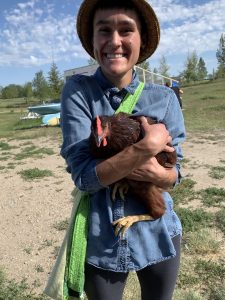 Though students have experienced many challenges over the past year of remote learning due to pandemic restrictions, there have been some benefits, some unexpected moments of grace. Such was the case for Lakeland Scriver (BSc’18), a Bachelor of Education After Degree (BEAD) student, who has found remote learning both challenging and rewarding.
Though students have experienced many challenges over the past year of remote learning due to pandemic restrictions, there have been some benefits, some unexpected moments of grace. Such was the case for Lakeland Scriver (BSc’18), a Bachelor of Education After Degree (BEAD) student, who has found remote learning both challenging and rewarding.
“Being in a pandemic, isolated, and under the stress of a busy university semester makes for a tougher experience in bringing your best self to the virtual classroom,” says Scriver.
The fall 2020 term was Scriver’s first semester in the Faculty of Education, and the challenges seemed daunting: “I was unfamiliar with the professors, staff, and nearly all of my classmates, and this was especially intimidating due to all first impressions being made on a computer screen,” says Scriver.
Scriver found ways to overcome feelings of isolation and intimidation, including being honest about the challenges they faced: “I found it helpful to use the chat function in Zoom and other programs to try and create the camaraderie I would normally build with my classmates. It was also beneficial for my classmates and I to be honest with our professors about our struggles with workloads and due dates. Everyone is in the same boat right now, and sometimes we just need to bridge that communication gap between the bow and the stern to figure out together how to keep the whole dang thing from sinking.”
Flexibility, transparency and honesty are aspects that Scriver hopes to model for their future students: “We moved deadlines, asked for changes or accommodations, and acknowledged when things were hard. I appreciated that very few people were shying away from discussing mental health, physical health, and how we were experiencing fluctuations in our well-being, now, during the pandemic, more than ever. I want to be an educator who practices this transparency with their students, and I hope my students will be transparent in return. We aren’t robots, we are people, and learning together means we need to demonstrate human compassion to our fluid, changing selves.”
Being the kind of teacher Scriver wishes they had as a student motivated their decision to do an after degree (major biology; minor general science) program. After pursuing and then withdrawing from an out-of-province Master’s of Science program, Scriver had an epiphany: “It turns out that the part of academia that is my greatest passion is the teaching and learning aspect! I want to be the kind of teacher I wish I had as a student: exuberant, enthusiastic, and authentically myself,” says Scriver.
Scriver experienced an unexpected benefit to remote learning as well: “As a transgender student,” Scriver says, “I’ve found that remote learning has been beneficial in presenting myself as I wish alongside my pronouns and chosen name. It feels less intimidating to challenge misgendering remotely than in-person. I have run into very few issues with respect to trans inclusion thus far. I’m not sure if that is the culture of the Faculty of Education or dumb luck, but I am grateful all the same!”
Remote learning has also given Scriver more opportunity for “introspection and metacognition,” which they feel has been reflected in their assignments. Further, Scriver says, “I feel like I handed in assignments that had more vulnerability and honesty in them than I might have demonstrated in busier, in-person classes.”
Though remote learning from home can allow for more vulnerability and honesty, these aspects can quickly turn awkward. Scriver recounts one instance in which the class watched as the instructor, who had muted their self momentarily, not-so-gently asked their partner in another room to turn down the volume on the TV, which was disrupting the class. Scriver says, “so awkward, but so funny…”
Students’ experiences teaching in schools
This academic year 290 interns and 297 pre-interns taught in schools! Practicums are an important part of our Education programs, but the prospect of doing one’s practicum during a pandemic can cause anxiety and new challenges. In this section, two students are introduced and their practicum experiences are shared: pre-intern Hanna Gross and intern Keelin Louttit.
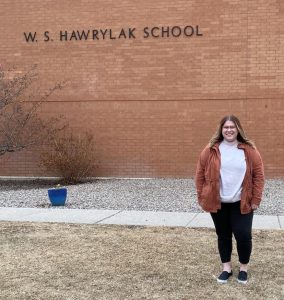
Hanna Gross has two major reasons she is becoming a teacher: She loves kids and has a passion for lifelong learning. A 4th-year student in the Elementary program, Gross hopes to instill her love of learning in her future students.
Gross loves the Faculty of Education program at the University of Regina because of “how much practical experience there is in the program and how close everyone is,” with the U of R being a mid-sized university with fewer students in classrooms. The most memorable experience in her program was her pre-internship. Gross says, “I was very excited for pre-internship and putting into practice what we are taught. Pre-internship was a confirmation that teaching is the most appropriate path for me.”
However, the prospect of pre-interning during a pandemic caused Gross some nervousness. “Not only was I nervous, but I was also concerned about whether or not we would be going out at all! In the weeks leading up to the pre-internship we saw Regina’s case numbers rising, and there was talk about not going out to schools. Also, I hadn’t been with students yet because we didn’t get our fall placements due to the pandemic. I was also fearful about how strict things would be in the schools and how I was going to adapt to an ‘in your desk and separate’ environment.” To ease her nerves, Gross talked with friends in the education program and some who had graduated and were already teaching about what teaching is really like during a pandemic. “They reassured me that it isn’t as scary as it sounds.” When Gross met her cooperating teacher Lori Burton, she began to relax: “Almost as soon as I met my coop and met the students my nervousness disappeared. She was phenomenal and the kids were excited to have me there.”
What surprised Gross about pre-interning during the pandemic was how open and helpful everyone was: “Teachers were inviting me into their classrooms. Kids were so open-minded and excited to try things, and even when it didn’t go great … Everyone was so forgiving and willing to help. I left the school with three boxes of resources, long lists of books to buy, and lots of advice.”
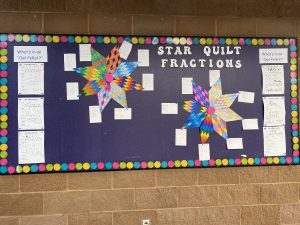
Gross appreciates how much she learned about herself as a teacher especially when things didn’t go well or as planned: “My co-op was very reassuring, encouraging me to take those risks and try those things because you need to know and if it doesn’t work it’s fine; it won’t ruin the kids. Try again the next day. Have grace with yourself. You’re not going to be perfect.”
One lesson Gross feels went especially well was a math fraction lesson using the star quilt. “Each student received a diamond color using three to six colours. They labeled their fractions and then we hung them on the bulletin board. I thought this was kind of fun and the kids liked it. For me, the bigger piece was that everyone was doing something, and came out of it with excitement about what they did that day: I got to see their brains focussed—engagement—and appreciation.”
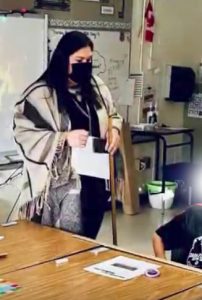
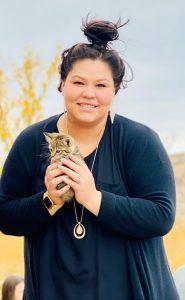
Keelin Louttit finished her Secondary education program (Major: social studies; Minor: inclusive ed) with her internship in the December 2020 term at École Lumsden Elementary School. She comes from a family of teachers and grew up seeing firsthand how teaching could make a difference: “My Grandma was a learning resource teacher. Seeing her face light up when she could help kids—I want that.” The University of Regina Education program made the most sense for Louttit because it was close to home (Balgonie). She says, “I also knew that it is one of the best education programs in Canada.”
The prospect of interning during a pandemic also made Louttit nervous. “I didn’t want to have to go online because I didn’t know how teaching online would be.” However, Louttit was soon able to relax: “The first day I met my co-op Corinna Dahl-Ritco, I relaxed and knew it was going to be okay. My co-op was so amazing and willing to help me with everything. I felt assured I would have a great experience.”
What surprised Louttit about interning during a pandemic was that “every day I was excited to go to school and see my students. It didn’t even seem like we were in a pandemic. It never really felt like a big scary thing. It was such a smooth process.”
For Louttit, the most memorable experience as a student here was joining the Education Students’ Society (ESS) as VP of Professional Development (PD) for 2019-2020. “The PD team was me and Jordan Balfour (2020-2021 President) and Kiah Holness (2020-2021 VP of PD).” Her ESS connections were valuable during her internship experience because she was made aware of potential funding from ESS for interns to help with the costs of materials for projects.
A project that the ESS helped fund was a scarf-making project. Louttit’s class was responsible for the December Virtual School Assembly. Due to the season, Louttit wanted to focus on a theme of giving and kindness. Louttit says, “I wanted to do something special but not take away too much time from curriculum and instruction.” The scarf project had multiple connections to the curriculum. To fund the materials for the activity, Louttit sent a proposal to the ESS and received funding to help cover the costs of the materials. She also received funding from the school. Students made the scarves and the finished scarves were donated to those in need of them: “We took some to the Lumsden Heritage Home, a long-term care facility, and some to downtown Regina.”
After the scarves were delivered, “A lot of Heritage Home residents were smiling and some even crying at the windows and wanted to see the kids and watch them play. At a time when kids are thinking about receiving gifts, they got to give gifts and experience the joy of giving.” (See video below)
As advice to future interns, Louttit says, “Find one way that you can contribute to stand out. Find ways to empower your students. Not just on internship, but as a lifelong skill.” Louttit received a temporary contract at the same school as she interned at until Easter and she is now a substitute teacher. She plans to begin a Certificate of Inclusive Education in Spring.
Follow us on social media